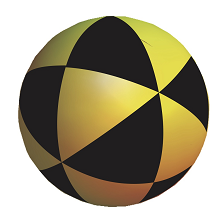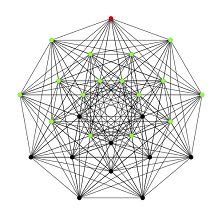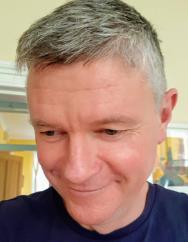Brent Everitt
Visit Brent Everitt's profile on the York Research Database to:
- See a full list of publications
- Browse activities and projects
- Explore connections, collaborators, related work and more
Profile
Biography
I did my undergraduate degree in Auckland and postgraduate degrees in Toronto and Auckland. After short positions in Aberdeen, Warwick and Durham, I moved to York in 1999.
Research
Overview
I am interested in algebra, topology and combinatorics. Preferably all three at once.
An apartment in a building of type A3 (view on PURE)
You can find most of my research articles on the arXiv.
Homological methods in algebra
An ongoing project, joint with Paul Turner, on combinatorial sheaves on categories and their (co)homology. These objects play a similar role in homological algebra to that played by modules in other parts of algebra: they provide a unifying framework into which a variety of different problems. can be shoehorned. Much of this stuff grew out of work that we did on the Khovanov homology of knots and links. Here are some recent lecture notes on Khovanov homology for beginners. More recently we have been looking at hyperplane arrangements (here and here) and matroids.
Partial symmetry
Another ongoing project, joint with John Fountain and more recently James East. If by “mirror symmetry” one means the theory of reflection groups, then by “partial mirror symmetry” one means the theory of reflection monoids. Reflection groups lie at the intersection of many parts of algebra and mathematical physics. Reflection monoids were invented by John Fountain and myself in 2010.
Representation theory
Quite a few years ago now I proved that every Fuchsian group has among its homomorphic images all but finitely many of the alternating groups. This answered an old conjecture of Graham Higman that had its origins in the study of groups of conformal automorphisms of Riemann surfaces. Here is a very old talk on this and its connection with the congruence subgroup problem. So I have always been interested in the representation theory of infinite discrete groups. More recently, and as an off-shoot of the partial symmetry programme, I have become interested in the representation theory of inverse monoids. Here are some recent lecture notes on the representations of inverse monoids, written mainly for group theorists.
Geometric manifolds
Steve Tschantz's picture of the 1-skeleton of the 6-dimensional Gosset polytope 221 (view on PURE)
I work less on this these days, although there are a few open problems that still bug me (particularly this old chestnut: what is the minimum volume of a compact hyperbolic 4-manifold?). Over the years I worked with John Ratcliffe, Steve Tschantz and Colin Maclachlan (Aberdeen). Most of this work has been on the volume spectra of orientable hyperbolic manifolds in a given dimension, usually an even dimension, where the presence of an Euler characteristic makes life a lot easier. A highlight was a solution to the Siegel problem in 6-dimensions, with the construction of a minimal volume orientable (but non-compact) hyperbolic 6-manifold. The construction is essentially algebro-combinatorial and uses Coxeter groups.
Research group(s)
Available PhD research projects
I am happy to discuss potential PhD projects in any of the above areas.
Supervision
Former PhD students:
- Majed Albaity
- Nouf Alqahtani
- Sanaa Bajri
- Guinevere Dyker
- Sam Ford
- Mihail Hurmuzov
- Sajida Koussar
- Jim Woodward
Contact details
External activities
Invited talks and conferences
(just the ones from this millennium...)
- (An invitation to) Reflection monoids, June 2022, Geometric Semigroup Theory conference, York.
- (Co)Homology of arrangements, November 2021, York.
- (Co)Homology of arrangements, October 2021, Fribourg, Switzerland.
- (Co)Homology of arrangements, September 2021, 21st IPMC, Islamabad, Pakistan.
- (Co)Homology of arrangements, November 2020, Newcastle.
- (Volumes of) hyperbolic manifolds, April 2019, Oberwolfach.
- (Co)homology of arrangements, June 2018, BMC St Andrews.
- (Co)homology of arrangements, May 2018, Royal Holloway, London.
- (Co)homology of arrangements, April 2018, Glasgow.
- (Co)homology of arrangements, February 2018, York.
- Higher limits of sheaves, April 2017, BMC Durham.
- Khovanov homology 101, August 2016, AIMS-Ghana (I wasn't able to give these in the end...but here they are anyway).
- Higher Limits, February 2016, Southampton.
- Higher Limits, January 2016, Heilbronn Institute, Bristol.
- The homotopy theory of Khovanov homology, March 2014, Sheffield.
- The homotopy theory of Khovanov homology, February 2014, Glasgow.
- Partial mirror symmetry, December 2013, UEA.
- A Problem of Siegel, June 2012, Fribourg, Switzerland.
- A Problem of Siegel, April 2012, Adelaide, Australia.
- Four Lectures on Buildings, June 2011, Fribourg, Switzerland.
- Knots, posets and sheaves, May 2011, Adelaide, Australia.
- Knots, posets and sheaves, March 2011, Bar-Ilan, Israel.
- Knots, posets and sheaves, December 2010, ICMS, Edinburgh.
- Knots, posets and sheaves, October 2010, Leeds.
- Symmetry and partial symmetry, October 2009, Ilorin, Nigeria.
- Coloured poset homology, May 2009, Leicester.
- Coloured poset homology, March 2009, Durham.
- Coloured poset homology, November 2008, Manchester.
- Partial symmetry, reflection monoids and Coxeter groups, June 2008, Heriot-Watt.
- Knot invariants: natural and not, December 2007, Newcastle colloquium
- Knot invariants: natural and not, November 2007, York.
- Weyl groups, lattices and geometric manifolds, July 2007, Hyperbolic Volume Fribourg, Switzerland
- Partial mirror symmetry: reflection monoids, June 2007, Maxwell Institute, Edinburgh
- Partial mirror symmetry, November 2006, Sydney.
- Coxeter groups and geometric manifolds, October 2006, Institute of Geometry and its Applications, Adelaide.
- Siegel's Problem, March 2005, Cambridge.
- Siegel's Problem, February 2005, Warwick.
- Coxeter groups and geometric manifolds, October 2004, Sydney.
- Coxeter groups and geometric manifolds, August 2004, Discrete Groups and Hyperbolic Manifolds, Aberdeen. (in honour of the retirement of Colin Maclachlan)
- Coxeter groups and geometric manifolds, July 2004, London Mathematical Society Invited Lecture Series, Southampton.
- Coxeter groups and geometric manifolds, May 2004, Fribourg (Switzerland).
- Coxeter groups and geometric manifolds, March 2004, Southampton.
- Coxeter groups and geometric manifolds, March 2004, British Postgraduate group theory conference, Warwick.
- Coxeter groups and geometric manifolds, February 2004, North British geometric group theory, ICMS, Edinburgh.
- Coxeter groups and geometric manifolds, October 2003, Vanderbilt, Tennessee.
- Coxeter groups and geometric manifolds, October 2003, UT Austin, Texas.
- The Geometry and Topology of Groups, May 2003, Universidad Autonoma, Madrid.
- A conjecture of Serre, April 2003, Leeds.
- A conjecture of Serre, March 2003: Imperial College (London algebra colloquium).
- Rigidity and Arithmeticity, January-March 2003, York.
- Images of geometric groups, November 2002, Newcastle.
- Images of geometric groups, November 2002, Aberdeen.
- A conjecture of Serre, September 2002, Conference marking the Anniversary of the birth of V I Borevich, St Petersburg.
- Images of geometric groups, July 2001, Aspects of finitely generated groups, Trento.
- Algebraic Geometry over Groups, March 2001, Warwick.




